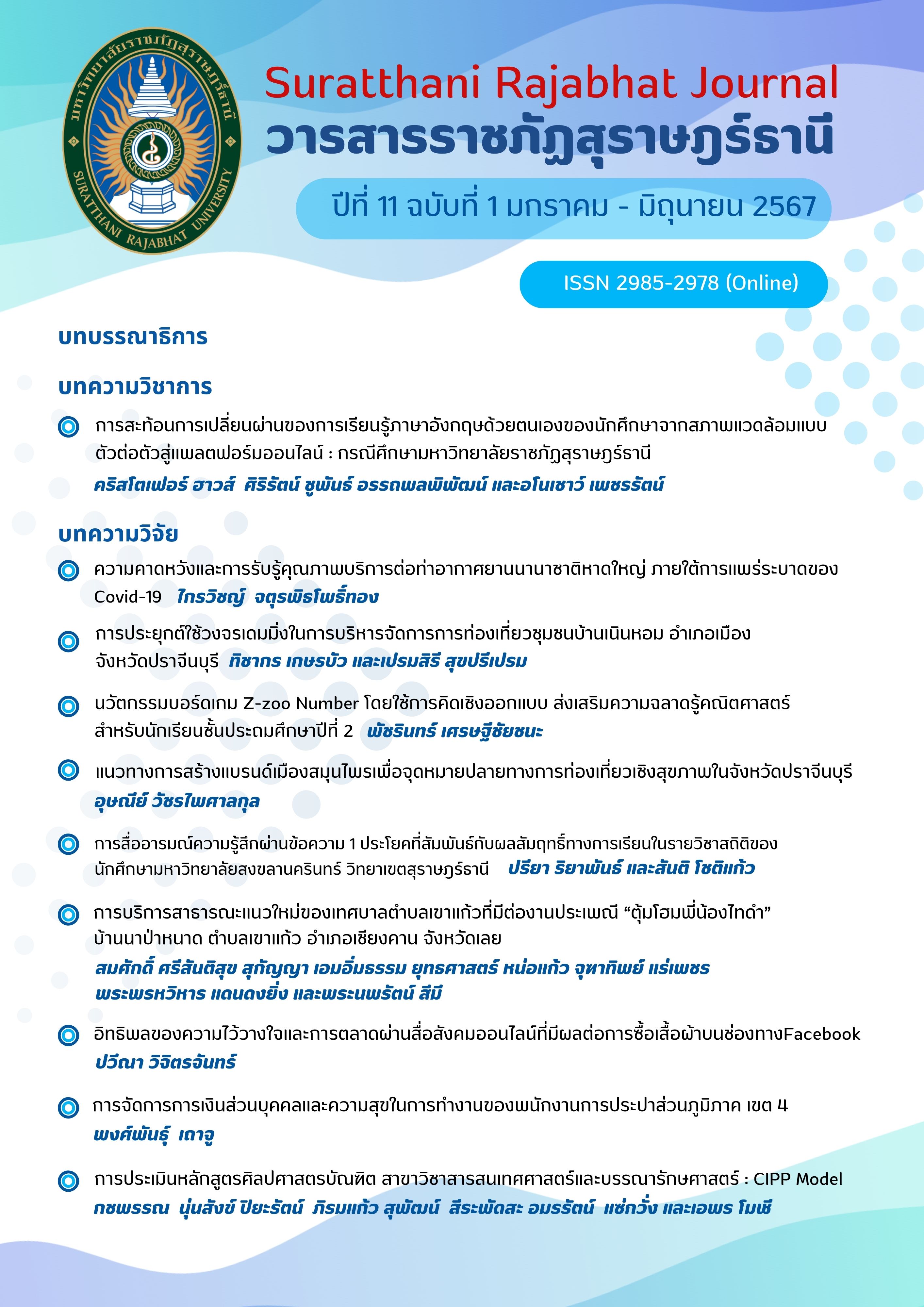Personal Financial Management and Happiness at Work of Employees of the Provincial Waterworks Authority Region 4
Main Article Content
Abstract
The objectives of this study were: 1) to study the personal financial management of employees of the Provincial Waterworks Authority Region 4; 2) to study the happiness at work of employees of the Provincial Waterworks Authority Region 4; and 3) to study the relationship between personal financial management and happiness at work Provincial Waterworks Authority Region 4. The population used in the study were employees of the regional waterworks authority in District 4, totaling 1,189 people. The sample size of 300 was calculated using the formula of Taro Yamane, and a stratified random sampling method was used with a questionnaire as a tool for data collection. The value of the index of coincidence (IOC) is 1 and the confidence level is .977. Basic statistics were used for data analysis, mean, standard deviation, and inferential statistics, such as Pearson correlation coefficient analysis.
The results revealed that 1) Opinions of the majority of employees about the personal financial management of employees of the Provincial Waterworks Authority Region 4 were at a moderate level (= 3.20,S.D. = 0.67). 2) Most of the employees had opinions about the happiness at work of employees of the Provincial Waterworks Authority Region 4 at a high level (
= 4.08, (S.D. = 0.58). 3) There is a positive correlation at a low level between personal financial management factors and happiness at work (r = 0.417) significantly at 0.05 level. This means that poor financial management results in reduced happiness at work. Therefore, there should be guidelines recommended to employees to be cautious in their spending according to the principles of self-sufficiency economics. This includes keeping household accounts, as well as managing debt and building financial stability.
Article Details

This work is licensed under a Creative Commons Attribution-NonCommercial-NoDerivatives 4.0 International License.
References
Boonputtikorn, C. (2020). Development of a norm of financial management test for undergraduate students of Rajamangala University of Technology Suvarnabhumi. Journal RMUTSB Acad. (Humanities and social sciences), 5(1),125-135 .(in Thai). https://so05.tci-thaijo.org/index.php/rmutsb-hs/article/view/209781.
Chansawaang, T. & Musikapodok, P (2018). Factors Influencing Personal financial planning behavior of undergraduate Students Siam University]. The 11th National Academic Conference of 2019 “Professional management in a disruptive world”,154-161, (in Thai). https://mba.siam.edu/wp-content/uploads/2019/08/Siam-University-11th-NATIONAL-ACADEMIC-CONFERENCE-OF-2019-17MB.pdf.
Chinachoti, P., Siriwongse, T. & Vivadhnajat, S. (2016). The Relation Between Quality of Work Life and Work Happiness of Before Retirement Employee in Industry Nonthaburi Province. MUT Journal of Business Administration, 13(2), 145-161. (in Thai). https://so04.tci-thaijo.org/index.php/journalmbsmut/article/view/77288/62020.
Chinatangkul C., Chinatangkul, S. & Dejbamrung, S. (2017). The Happiness of Work of Educational Personnels under Basic Education. Silpakorn Education Research Journal, 9(2) , 26-39. (in Thai). https://so05.tci-thaijo.org/index.php/suedureasearchjournal/article/view/111577/88544.
Hemloha, T. (2018). Factors affecting happiness at work of employees in HANAMicroelectronics Public Co., Ltd. Lamphun Province branch. Master of Public Administration Thesis, Chaing Mai Univeristy.
Hinkle, P., Dennis E., Wiersma, W., & Jurs, S. G. (2003). Applied Statistics for the Behavioral Sciences (5th ed.). Houghton Mifflin Harcourt. https://www.scirp.org/(S(lz5mqp453edsnp55rrgjct55))/reference/referencespapers.aspx?referenceid=2229977.
Jaiorn, P. (2021). The Causal Model of Macro-Environmental Factors, Financial Skills and Personal Finance Management Affecting the Success Factors in Financial Saving of Generation Y for Their Retirement. Economics and Business Administration Journal Thaksin University, 13(2), 61-74, (in Thai). https://so01.tci-thaijo.org/index.php/ecbatsu/article/view/244937/168009.
Kapoor, J.R., Dlabay, L.R.,Hughes,R.J., & Hart, M.M. (2017). Personal Finance. (12th ed.) New York: McGraw-Hill Education.
Kasikorn research Center. (2022). Economic: Household Debt. (in Thai). https://www.kasikornresearch.com/th/analysis/k-social-media/Pages/Household-Debt-FB-11-04-22.aspx?fbclid=IwAR0A1xyjFB-9aZn—BWbKjjpORmEiX7tjhU25dqvj_agLSIeLT1CU3dWdPo.
Khemvirat, S., Khemvirat, D., Kongpetch, T. & Sangsincharoenchai, P. (2012). Knowledges and Opiions of Personal Financial Management of Undergraduate: The case of Rajamangkala University of Technology in Bangkok area. The Faculty of Business, Rajamangkala University of Technology Pra Nakorn. (in Thai).
Falahati, L., Sabri, M. F. & Paim, L. (2012). Assessment a Model of Financial Satisfaction Predictors: Examining the Mediate Effect of Financial Behaviour and Financial Strain. World Applied Sciences Journal, 20(2), 190-197. https://www.researchgate.net/publication/287278981_Assessment_a_model_of_financial_satisfaction_predictors_Examining_the_mediate_effect_of_financial_behaviour_and_financial_strain.
Luecha T. & Yoongthong, K. (2017). Concept and Measurement of Happiness at Work. Phetchabun Rajabhat Journal, 19(2), 9-18. (in Thai). https://so05.tci-thaijo.org/index.php/jpcru/article/view/202887/141505.
Manion, J. (2003). Joy at work: Creating a positive work place. Journal of Nursing Administration, 33(12), 652-659. https://journals.lww.com/jonajournal/Abstract/2003/12000/Joy_at_Work___Creating_a_Positive_Workplace.8.aspx.
Nation Saving Fund . (2019). Vision, (in Thai). https://www.nsf.or.th/content/วิสัยทัศน์-พันธกิจ.
Plodjaidee, U. (2017). Personal Finance Management Affecting Success in Retirement Planning of Private Enterprise Employees in Bangkok. Master of Business Administration Thesis, Siam University.
Sansri, R. and Sokatiyanurak, M. (2020). Knowledge and Understanding of the Philosophy of the Sufficiency Economy, By Application of the Philosophy of Sufficiency Economy in Personal Finance Management and the Results of Personal Financial Management of Non-Agricultural People. Journal of Public and Private Management, 29(2), 31-53. (in Thai). https://so03.tci-thaijo.org/index.php/ppmjournal/article/view/209483.
Sirinukulwattana, S. (2021). A Personal Financial Management Guideline for Effective Retirement Plan of Employees of Rajabhat University. Journal of Management Science Nakhon Pathom Rajabhat University, 8(1), 216-231. (in Thai). https://so03.tcithaijo.org/index.php/JMSNPRU/article/view/253357/169753.
Sukwattanasap, P. (2020). Factors of Economics and Environmental Factors on Savings are Related to Behavior of Managing Personal Finances of Working People in Bangkok. SSRU Journal of Public Administration, 3(2), 1-11. (in Thai). https://so04.tci-thaijo.org/index.php/SSRUJPD/article/view/248397.
Teeratansirikool, L. (2020). Personal Finance Management Techniques in CRISIS. Journal of Liberal Arts and Management Science Kasetsart University, 7(2), 150-163, (in Thai). https://kuojs.lib.ku.ac.th/index.php/jfam/article/view/4089.
Thammanittayakul, P. and Muangsan, U. (2017). Development Personal Financial Management Model of Government Officials In The Royal Thai Navy. Journal of Pacific Institute of Management Science, 4(1), 98-119. (in Thai). https://so05.tci-thaijo.org/index.php/pacific/article/view/177350/126352.
The Chaipattana Foundation, (2022). Sufficiency Economy. (in Thai). https://www.chaipat.or.th/publication/publish-document/sufficeen cy-economy.html.
Wiboonsorn, Y.R. (2013). Measurement and Achievement Test Construction. 11th ed., Bangkok: Chulalongkorn University Press. (in Thai).
Yamane, T. (1967). Statistics, An Introductory Analysis,2nd Ed., New York : Harper and Row. http://www.sciepub.com/reference/180098.


